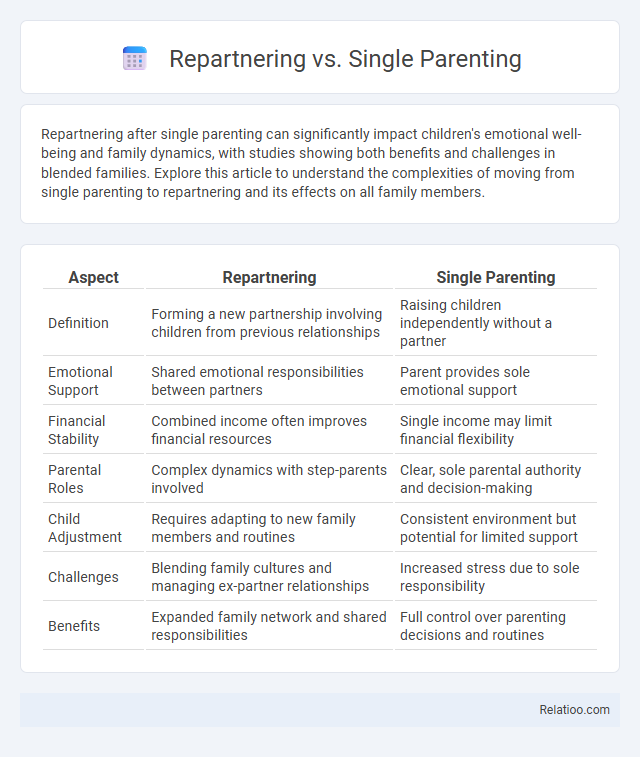Repartnering after single parenting can significantly impact children's emotional well-being and family dynamics, with studies showing both benefits and challenges in blended families. Explore this article to understand the complexities of moving from single parenting to repartnering and its effects on all family members.
Table of Comparison
| Aspect | Repartnering | Single Parenting |
|---|---|---|
| Definition | Forming a new partnership involving children from previous relationships | Raising children independently without a partner |
| Emotional Support | Shared emotional responsibilities between partners | Parent provides sole emotional support |
| Financial Stability | Combined income often improves financial resources | Single income may limit financial flexibility |
| Parental Roles | Complex dynamics with step-parents involved | Clear, sole parental authority and decision-making |
| Child Adjustment | Requires adapting to new family members and routines | Consistent environment but potential for limited support |
| Challenges | Blending family cultures and managing ex-partner relationships | Increased stress due to sole responsibility |
| Benefits | Expanded family network and shared responsibilities | Full control over parenting decisions and routines |
Understanding Repartnering vs Single Parenting
Repartnering involves forming a new romantic relationship after separation or divorce, often introducing complexities like blended family dynamics and co-parenting challenges. Single parenting requires managing child-rearing responsibilities independently, emphasizing emotional resilience and resource management without a partner's support. Understanding the distinctions between repartnering and single parenting highlights the differing emotional, logistical, and social impacts on both the parent and children involved.
Emotional Impacts on Parents and Children
Repartnering after single parenting can significantly affect the emotional well-being of both parents and children, often introducing complex feelings such as loyalty conflicts and insecurity. Single parenting typically heightens stress and emotional strain due to sole caregiving responsibilities, which can impact parent-child attachment and overall family stability. Emotional impacts of repartnering involve navigating new family dynamics, with potential benefits including increased support for parents and enhanced social development for children if managed with open communication and sensitivity.
Financial Stability: Comparing Both Paths
Repartnering can enhance your financial stability by combining incomes and sharing expenses, leading to improved economic resources and potential savings. Single parenting often requires careful budgeting and reliance on a single income, which can limit financial growth but encourages strong fiscal discipline. Comparing both paths, repartnering typically offers greater financial advantages, though successful management depends on clear communication and aligned financial goals.
Social Support Systems and Community
Repartnering offers enhanced social support systems by integrating new adult figures, which can provide emotional stability and shared parenting responsibilities, benefiting both adults and children. Single parenting often relies heavily on extended family, friends, and community resources for support, creating diverse but sometimes inconsistent networks that influence child development and parental well-being. In both repartnering and single parenting, community engagement and access to support groups play crucial roles in mitigating stress and fostering resilience within family dynamics.
Effects on Child Development
Repartnering can influence child development by introducing new parental figures and altering family dynamics, which may enhance emotional support or create adjustment challenges for children. Single parenting often requires balancing multiple roles, potentially impacting a child's sense of stability and emotional well-being due to limited resources or time. Your approach to these family structures plays a critical role in fostering resilience and healthy development in children, emphasizing the importance of consistent communication and emotional security.
Navigating Co-Parenting Challenges
Navigating co-parenting challenges requires clear communication and mutual respect, whether you are single parenting or repartnering. Establishing consistent boundaries and shared parenting goals helps reduce conflicts and supports your children's emotional stability. Prioritizing your children's well-being while managing new relationships is essential for successful co-parenting dynamics.
Finding Personal Fulfillment and Growth
Finding personal fulfillment and growth in repartnering involves navigating new relationships while maintaining a strong sense of individuality and emotional resilience. Single parenting emphasizes self-reliance, fostering personal development through managing diverse responsibilities and nurturing a balanced lifestyle. Balancing repartnering with single parenting requires intentional communication and self-awareness to promote growth within evolving family dynamics.
Addressing Common Stigmas and Myths
Repartnering often faces stigmas such as assumptions of selfishness or instability, while single parenting is sometimes wrongly perceived as a sign of failure or inadequacy. Myths that repartnered families are inherently dysfunctional overlook the resilience and adaptability of blended households, and single parents frequently demonstrate strong independence and effective co-parenting under challenging circumstances. Addressing these misconceptions involves recognizing diverse family dynamics and promoting supportive narratives that validate all parenting choices.
Key Considerations Before Making a Choice
Repartnering involves blending families and requires evaluating emotional readiness, financial stability, and the impact on children's well-being, whereas single parenting demands self-reliance and strong support systems to manage daily responsibilities. Key considerations before choosing include assessing personal capacity for commitment, communication dynamics with children and ex-partners, and long-term goals for family cohesion and stability. Understanding the legal implications and potential challenges in each arrangement helps ensure informed decisions aligned with individual and family needs.
Long-Term Outcomes and Wellbeing
Repartnering, single parenting, and repartnering each uniquely impact long-term outcomes and wellbeing, with repartnering often associated with improved emotional support and economic stability, enhancing overall quality of life. Single parenting can present challenges such as increased stress and financial strain, which may affect both your and children's mental health over time. Research shows that successful repartnering promotes better social integration and resilience, contributing to sustained wellbeing across families.

Infographic: Repartnering vs Single Parenting
 relatioo.com
relatioo.com